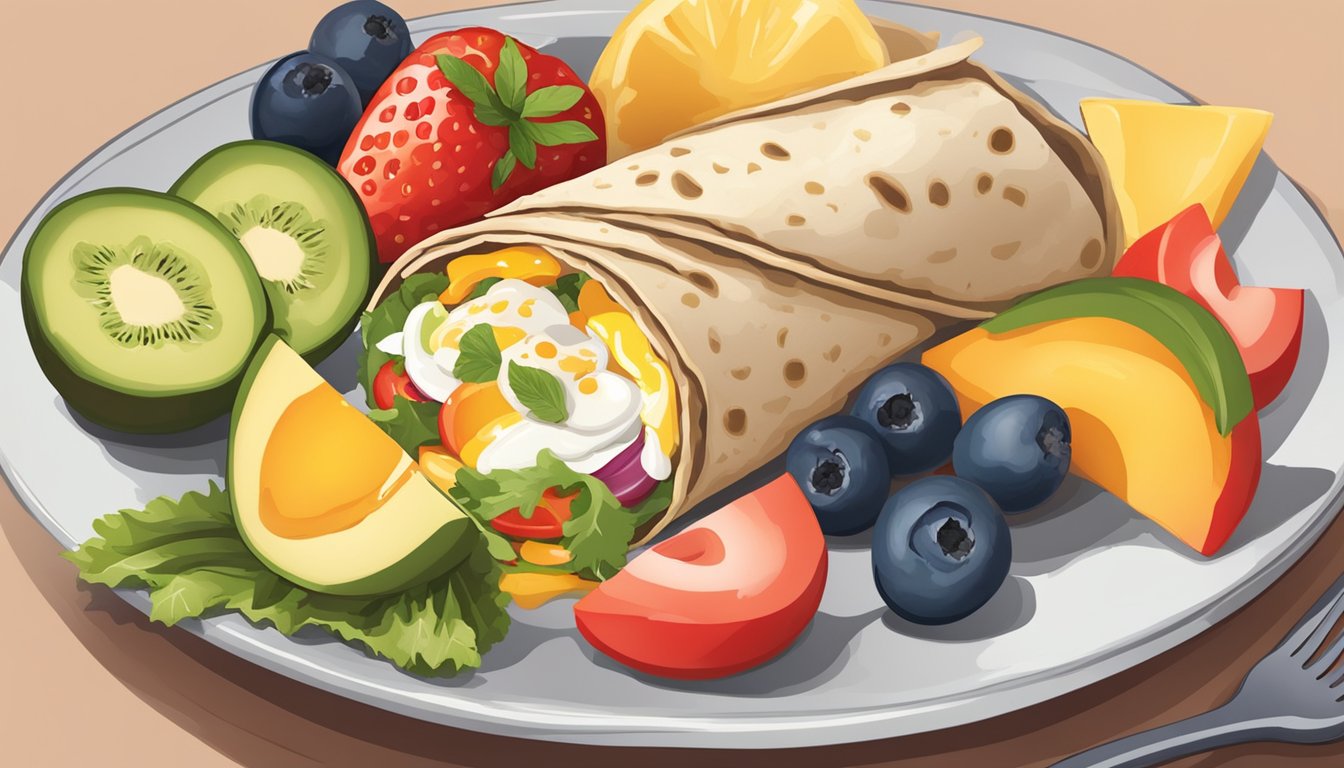Breakfast burritos have become a popular morning meal option for many, offering a convenient and filling start to the day. These handheld delights typically consist of eggs, meat, cheese, and vegetables wrapped in a tortilla. The healthiness of breakfast burritos depends largely on their ingredients and preparation methods.
While fast-food versions tend to be high in calories, fat, and sodium, homemade breakfast burritos can be a nutritious choice. By using whole grain tortillas, lean proteins, and fresh vegetables, one can create a balanced meal that provides essential nutrients. Eggs offer protein and vitamins, while vegetables add fiber and antioxidants.
Portion control plays a crucial role in maintaining the healthiness of breakfast burritos. Opting for smaller tortillas and being mindful of high-calorie additions like cheese and sour cream can help keep the meal in check. With smart ingredient choices and proper portioning, breakfast burritos can be a satisfying and healthy way to fuel the morning.
The Nutritional Makeup of a Breakfast Burrito

Breakfast burritos contain a variety of ingredients that contribute to their nutritional profile. These components include protein sources, carbohydrates from tortillas, and various vegetables and add-ins.
Protein Sources
Eggs serve as a primary protein source in breakfast burritos. They provide high-quality protein and essential nutrients like vitamin D, B12, and choline. Lean meats such as turkey sausage or chicken can boost protein content while keeping fat levels in check. For vegetarian options, beans or tofu offer plant-based protein alternatives.
Cheese adds protein and calcium but also increases fat content. Low-fat cheese varieties can be used to reduce overall calorie intake. Greek yogurt can be incorporated as a protein-rich, lower-fat alternative to sour cream.
Carbohydrates in Tortillas
Tortillas form the base of breakfast burritos and contribute significantly to their carbohydrate content. Whole-grain or whole wheat tortillas provide more fiber and nutrients compared to refined flour options. These complex carbohydrates offer sustained energy and better blood sugar control.
Fiber content in whole-grain tortillas supports digestive health and promotes feelings of fullness. The glycemic index of whole-grain tortillas is lower, which can be beneficial for managing blood sugar levels.
Vegetables and Add-Ins
Vegetables enhance the nutritional value of breakfast burritos by providing vitamins, minerals, and fiber. Spinach and kale offer iron, vitamin K, and antioxidants. Bell peppers contribute vitamin C and beta-carotene.
Avocado adds healthy monounsaturated fats and fiber. It also provides potassium and vitamin E. Salsa can be a low-calorie way to add flavor and increase vegetable intake. It contains lycopene from tomatoes and vitamin C from peppers.
Onions and garlic not only add flavor but also provide antioxidants. Black beans or pinto beans can increase fiber and protein content while adding essential minerals like iron and magnesium.
Health Considerations of Breakfast Burritos

Breakfast burritos can vary widely in their nutritional value depending on ingredients and preparation methods. Key factors to consider include calorie content, fat and cholesterol levels, and sodium amounts.
Caloric Content
Breakfast burritos typically contain 400-700 calories per serving. This calorie range can fit into a balanced diet for many adults, but portion sizes matter. Large burritos from restaurants may exceed 1000 calories.
Calorie sources in burritos include:
- Tortilla: 200-300 calories
- Eggs: 70-140 calories
- Cheese: 50-100 calories per ounce
- Meat: 100-200 calories
For weight management, be mindful of extras like sour cream or guacamole. These can add 50-100 calories per tablespoon. Opting for smaller tortillas or using egg whites can reduce overall calorie content.
Fat and Cholesterol
Fat content in breakfast burritos ranges from 20-40 grams, with saturated fat varying based on ingredients. Cheese and fatty meats contribute most to saturated fat levels.
Cholesterol sources:
- Eggs: ~185 mg per egg
- Cheese: 25-30 mg per ounce
- Sausage: 30-40 mg per ounce
To reduce fat and cholesterol:
- Choose lean proteins like turkey or beans
- Use low-fat cheese or reduce the amount
- Add avocado for healthy fats
Egg whites can lower cholesterol while maintaining protein content. Vegetable-rich burritos offer fiber and nutrients with less fat.
Sodium and Preservatives
Sodium levels in breakfast burritos can be high, especially in frozen or fast food versions. Restaurant burritos may contain 1000-1500 mg of sodium – over half the daily recommended limit.
Sodium sources:
- Tortilla: 300-600 mg
- Cheese: 150-200 mg per ounce
- Processed meats: 200-400 mg per serving
Frozen burritos often have added preservatives to extend shelf life. These may include:
- Sodium nitrite
- BHT (butylated hydroxytoluene)
- Propylene glycol
To reduce sodium, prepare burritos at home using fresh ingredients. Choose low-sodium cheeses and avoid processed meats. Flavor with herbs and spices instead of salt.
Creating a Healthier Breakfast Burrito
Breakfast burritos can be a nutritious and satisfying morning meal when prepared thoughtfully. By selecting wholesome ingredients, controlling portions, and using healthier cooking methods, it’s possible to create a balanced and delicious breakfast wrap.
Choosing Nutritious Ingredients
Opt for whole grain tortillas as the base for added fiber and nutrients. Fill the burrito with lean protein sources like scrambled eggs or egg whites, which provide essential amino acids. Include a variety of colorful vegetables such as spinach, bell peppers, and tomatoes to boost vitamin and mineral content.
Choose low-fat dairy options like reduced-fat cheese or Greek yogurt for calcium without excess saturated fat. Add black beans or pinto beans for extra fiber and plant-based protein. Avocado slices offer healthy fats and creaminess.
Limit high-sodium ingredients. Use fresh salsa instead of packaged versions to reduce salt intake. Herbs and spices can enhance flavor without added calories.
Portion Control and Balance
Keep tortilla size in check. Use 8-inch whole wheat tortillas to manage calorie intake. Fill the burrito with a balanced mix of ingredients.
Aim for:
- 1/4 cup scrambled eggs or egg whites
- 1/4 cup beans
- 1/4 cup vegetables
- 1 tablespoon low-fat cheese
- 1-2 slices of avocado
This combination provides a good balance of protein, carbohydrates, and healthy fats. Be mindful of added toppings like sour cream or guacamole, which can quickly increase calorie content.
Healthier Cooking Methods
Prepare ingredients using minimal added fats. Scramble eggs in a non-stick pan with cooking spray instead of butter or oil. Steam or grill vegetables to retain nutrients and avoid extra calories from frying.
If using meat, choose lean options like turkey bacon or chicken breast. Grill or bake these proteins rather than frying. For beans, select low-sodium canned varieties or cook dried beans without added salt.
Assemble burritos just before eating to maintain freshness. If making ahead, wrap tightly in foil and refrigerate. Reheat in the oven or microwave, avoiding deep-frying or pan-frying in oil.
Alternatives to Traditional Breakfast Burritos
Breakfast burritos can be modified or replaced with nutritious options that provide balanced morning meals. Creative alternatives offer variety while still delivering essential nutrients to start the day.
Homemade vs. Store-Bought
Homemade breakfast burritos allow for complete control over ingredients and portion sizes. Use whole wheat tortillas, egg whites, and lean proteins like turkey bacon or black beans. Add plenty of vegetables such as spinach, peppers, and tomatoes.
Store-bought frozen burritos offer convenience but often contain preservatives and excess sodium. Read labels carefully and choose versions with recognizable ingredients. Some brands now offer healthier frozen options with whole grains and more vegetables.
For a quick homemade version, prep ingredients in advance and assemble burritos the night before. Wrap in foil and reheat in the morning for a grab-and-go meal.
Non-Burrito Healthy Breakfasts
Explore non-burrito options that provide similar nutritional benefits. Greek yogurt parfaits layered with fresh fruit and granola offer protein and fiber. Overnight oats prepared with milk, chia seeds, and fruit create a filling, no-cook breakfast.
Avocado toast on whole grain bread topped with a poached egg delivers healthy fats and protein. For a warm option, try a vegetable and egg white frittata or a quinoa breakfast bowl with nuts and berries.
Smoothie bowls blend frozen fruit, greens, and protein powder for a nutrient-dense meal. Top with seeds, nuts, and fresh fruit for added texture and nutrients.




